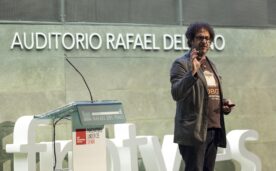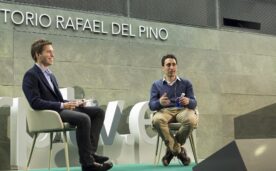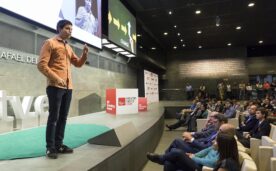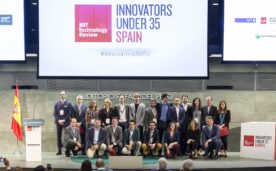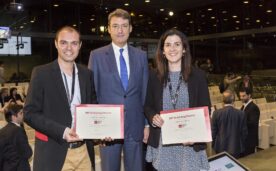MIT Technology Review, a publication owned by the Massachusetts Institute of Technology, presented the sixth generation of Innovators Under 35 Spain 2016 on 27 October at the Rafael del Pino Foundation in Madrid.
The 10 young Spaniards awarded in 2016 work in the area of science, innovation and technology and have developed innovative projects in fields such as biomedicine, telecommunications and energy, among others.
Every year, MIT Technology Review magazine recognises the talent of young innovators and entrepreneurs through the different editions of Innovators Under 35 around the world. The aim is to promote the development of new technologies to solve the challenges and problems affecting society today.
The winners of the sixth edition of Innovators Under 35 Spain 2016 have been:
1. Jordina Arcal - HealthApp. This start-up develops applications to improve communication between patients and therapists in the treatment of chronic diseases, eating disorders or long-term conditions.
2. Luis Cuende - Stampery. His company allows users to certify the existence, integrity and ownership of any file or communication by means of blockchain technology.
3. César de la Fuente - Massachusetts Institute of Technology (MIT). It has developed a technology to prevent the formation of complex communities of bacteria (biofilms) that are particularly resistant to current antibiotics.
4. Óscar Flores - Made of Genes. It has developed the first marketplace for applications based on the human genome. The company offers its users the possibility to sequence their genome and store it securely for life.
5. Esther García - Eneso. This technology-based company is dedicated to the development and commercialisation of products to facilitate access to technology for people with disabilities.
6. Javier Hernández - Massachusetts Institute of Technology (MIT). It has created a technological tool capable of measuring, identifying and minimising unnecessary stress and avoiding its negative health consequences. Stress levels are measured using devices such as a computer keyboard or mouse, which capture changes in users' muscle tension.
7. Javier Jiménez - New Born Solutions. Biomedical start-up leading the development of Neosonics, a medical device that allows non-invasive testing for meningitis in infants as an alternative to lumbar puncture, a risky method not always available in resource-limited settings.
8. Gonzalo Murillo - National Centre for Microelectronics. It has developed and patented miniaturised, self-contained wireless sensors that draw mechanical energy from the environment and convert it into electricity to avoid energy dependence on batteries, generate economic savings and reduce ecological impact.
9. Blanca Rodríguez - Smile&Learn. A digital platform of stories and games for children that, through Big Data analysis, allows parents to monitor their children's learning and identify new needs while they enjoy themselves and have fun.
10. Carlos Sánchez - Asana Weartech. His technology start-up focuses on the development of high-precision electronic sensors that are integrated into clothing and collect information related to posture or spinal movements to help prevent scoliosis.
Two special mentions were awarded during the award ceremony: Innovator of the Year and 'Social Innovator'. with the aim of recognising, on the one hand, the young person who proposes the most innovative project and demonstrates a high capacity to put it on the market and, on the other hand, the one who stands out for the impact that his or her project generates in improving the quality of life of people at a global level.
Also present at this sixth edition were members of the Innovators Under 35 community, such as Ron EvansRingleader at The Hybrid Group; Ander MichelenaCEO at ticketBis; Iñaki BerenguerCEO and Cofounder of Coverwallet o Pau García Millá, co-founder of EyeOS and the first innovator to receive the 'Innovator of the Year' special mention in 2011.
Innovators Under 35 is a recognition that seeks to promote talent and entrepreneurship and to generate a pioneering community of future leaders and drivers of change. In 2016, the prize was awarded to more than 40 young people in five European countries: France, Belgium, Poland, Germany and Spain. All of them are the new members of this community that will meet on 24 November at the second edition of the Summit Europe in Barcelona.
